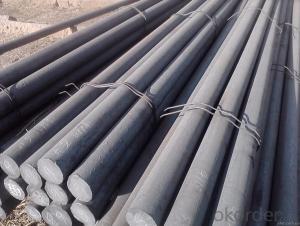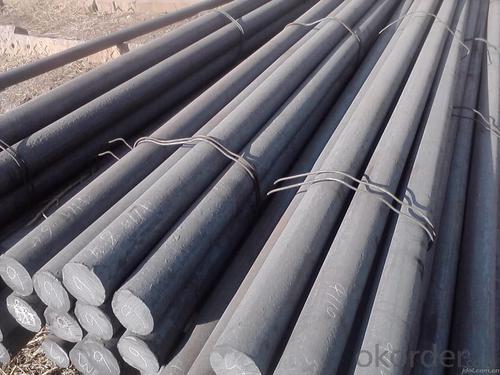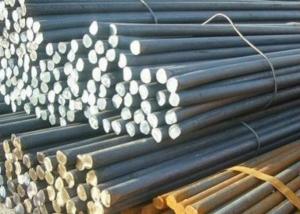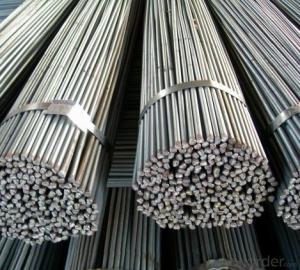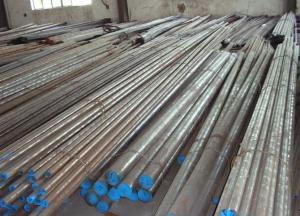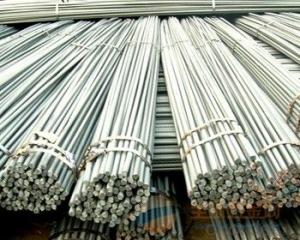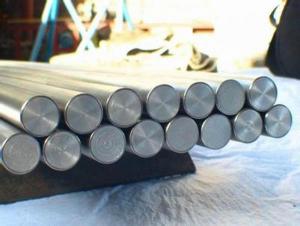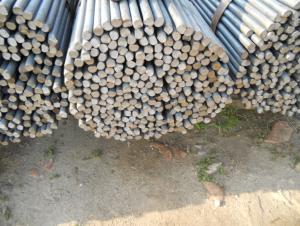Normal Steel Round Bars For Middle Sizes
- Loading Port:
- China main port
- Payment Terms:
- TT OR LC
- Min Order Qty:
- 25 m.t.
- Supply Capability:
- 5000 m.t./month
OKorder Service Pledge
OKorder Financial Service
You Might Also Like
Grade | AISI 52100, ASTM E52100, DIN 1.3505,JIS SUJ2, GCr15 |
Dimensions | Diameter: 30-60mm Length: 2000-13000mm or as required |
Shape | Round Bar |
Type | Alloy Steel Bar |
Delivery Condition | Black Surface |
Material | Bearing Steel |
Technique | Hot Rolled |
Usage and Applications
These steels are used for ball and roller bearing applications and are comprised of low carbon steels and high carbon through harden able steel.
First the famous 1C-1.5Cr steel from which the majority of bearings are made. Its structure is apparently well-understood and the focus is on purity in order to avoid inclusions which initiate fatigue during rolling contact. Then there is the M50 steel and its variants, from which bearings which serve at slightly higher temperatures in aeroengines are manufactured, based on secondary-hardened marten site.
Tapered roller bearing are generally used to support combined load mainly consisting of radial load. Their cups are separable for easy assembling ,During mounting and using, radial clearance and axial clearance can be adjusted and preloaded mounting can be made.
Packaging & Delivery
Packaging Detail: ASTM 52100 Steel in seaworthy packing or on customer request; Packed in bundles with standard export sea-worthy package or as customer require
Delivery Detail: 45 days after confirmed
Trade terms: FOB, CFR, CIF ou as customer's required
MOQ: 25 tons or at customer's demands. If the quantity is good, the price will be better.
Processing of Bearing Steel Round Bar
The processing of Bearing Steel Round Bar is hot rolled (strictly control sulphur, phosphorus and non-metallic inclusions content and distribution)
Chemical Composition of Bearing Steel Round Bar
C | Si | Mn | Cr | Ni | Cu |
Equal or less than | |||||
0.95-1.05 | 0.15-0.35 | 0.25-0.45 | Cr:1.40-1.65 | 0.30 | 0.25 |
All products' chemical composition and specification can be design according to customers' requirement.
Note
1. According to national standard (GB) for our products, if not, supply according to national standards (GB) or agreement.
2. We can not only provide electric furnace +LF+VD and electros lag re-melting (ESR) steel forging materials, but also forging products of piece, bar, etc.
3. Our company is equipped with roll equipment and can provide our customers with roll billets or finished.
4. Please send us your detailed specifications when inquire. We will reply to you ASAP.
5. Certificate of quality is issued in English, in addition the normal terms, production process, the mechanical property (yield strength, tensile strength, elongation and hardness. forged ratio, UT test result, Grain size, heat treatment methods and the sample of is shown on the certificate of quality.
- Q: What are the different types of steel round bar profiles?
- There are several different types of steel round bar profiles, including solid round bars, hollow round bars, and threaded round bars.
- Q: What are the advantages of using chromium-vanadium alloy steel round bars?
- Using chromium-vanadium alloy steel round bars has several advantages: 1. Exceptional Strength and Hardness: Chromium-vanadium alloy steel is renowned for its high strength and hardness. It possesses a strong tensile strength, making it ideal for heavy-duty applications and resistance against wear and tear. 2. Enhanced Durability: The incorporation of chromium and vanadium elements improves the durability of the alloy steel round bars. It offers excellent resistance to corrosion, oxidation, and high temperatures, making it perfect for harsh environments. 3. Versatility in Applications: Chromium-vanadium alloy steel round bars provide versatility in various applications. They are suitable for manufacturing tools, springs, gears, and other components requiring strength and durability. This alloy steel's versatility makes it highly favored in industries like automotive, aerospace, and construction. 4. Convenient Machinability: Chromium-vanadium alloy steel is relatively easy to machine and work with, offering convenience to manufacturers. It can be easily shaped, cut, and formed into desired sizes and shapes without compromising its mechanical properties. 5. Cost-Effective Option: Despite its exceptional properties, chromium-vanadium alloy steel round bars tend to be cost-effective when compared to other high-performance alloys. Hence, it is a popular choice for industries that require strong and durable materials within their budget. 6. Exceptional Fatigue Resistance: Chromium-vanadium alloy steel demonstrates exceptional fatigue resistance, making it suitable for applications involving repetitive stress or cyclic loading. It can withstand repeated use and maintain its structural integrity over an extended period. In conclusion, chromium-vanadium alloy steel round bars offer a combination of high strength, enhanced durability, versatility, and cost-effectiveness. These advantages make it the preferred material choice for various industrial applications where reliability and performance are of utmost importance.
- Q: Can steel round bars be used in the manufacturing of tools and equipment?
- Steel round bars are capable of being utilized in the production of tools and equipment. Steel is a favored material selection for the fabrication of tools and equipment because of its remarkable strength, durability, and adaptability. Steel round bars can be effortlessly molded, severed, and shaped into various tool components such as shafts, handles, and blades. Moreover, steel's elevated tensile strength and resistance to deterioration render it appropriate for demanding applications. It can endure the forces and strain involved in tool usage, ensuring a lengthy lifespan and reliable performance. Additionally, steel's ability to undergo heat treatment and hardening permits the creation of tools with heightened hardness and toughness, resulting in greater effectiveness in cutting, shaping, or gripping tasks. On the whole, steel round bars are a prevalent and extensively employed material in the production of tools and equipment due to their strength, durability, and adaptability.
- Q: Can steel round bars be used for making control arms?
- Yes, steel round bars can be used for making control arms. They are commonly used in the automotive industry as they provide strength, durability, and stability required for control arm applications.
- Q: Can steel round bars be used for making sculptures?
- Yes, steel round bars can be used for making sculptures. Steel is a versatile and durable material that can be manipulated into various forms and shapes. Round bars are particularly suitable for creating sculptures that require a smooth and curved aesthetic. Steel sculptures are known for their strength, longevity, and ability to withstand different weather conditions, making them suitable for both indoor and outdoor installations. Additionally, steel can be welded, bent, and shaped easily, allowing artists to explore their creativity and create intricate designs. With proper techniques and skills, steel round bars can be transformed into stunning sculptures that can add a modern and industrial touch to any space.
- Q: What are the differences between hot rolled stainless steel rounds and cold drawn round ones?
- The main differences are in mechanical properties. Forged round steel is used in the processing of some special performance requirements. Round steel three processing methods are more common, should be very wide surface.
- Q: Can steel round bars be used for making wire?
- Yes, steel round bars can be used for making wire by undergoing a process called wire drawing. In this process, the steel round bar is pulled through a series of progressively smaller dies, reducing its diameter and elongating it into wire form.
- Q: Are steel round bars suitable for marine applications?
- Yes, steel round bars are suitable for marine applications. Steel is known for its strength, durability, and corrosion resistance, making it a popular choice for various marine applications. Steel round bars are commonly used in the construction of marine structures, such as shipbuilding, offshore platforms, and marine equipment. The high tensile strength of steel allows it to withstand the harsh conditions of the marine environment, including the corrosive effects of saltwater. Additionally, steel can be easily fabricated and welded, making it a versatile material for marine applications. However, it is important to consider the specific requirements of the marine application and choose the appropriate type of steel round bar. Duplex stainless steel, for example, offers superior corrosion resistance compared to standard carbon steels and is often preferred for marine applications. It is also crucial to apply proper maintenance and protective coatings to ensure the longevity and performance of steel round bars in marine environments. Overall, steel round bars are a suitable choice for marine applications due to their strength, durability, and corrosion resistance. However, it is essential to select the right type of steel and implement proper maintenance practices to ensure optimal performance in the marine environment.
- Q: What are the different types of steel round bars used in the automotive engine components?
- Automotive engine components rely on various types of steel round bars, each possessing unique properties and applications. 1. Carbon Steel Round Bars: The most prevalent variant, carbon steel round bars, display exceptional strength and durability. Their versatility allows them to be employed in manifold applications such as crankshafts, connecting rods, and camshafts. They excel in withstanding elevated stress levels and extreme temperatures. 2. Alloy Steel Round Bars: By introducing alloying elements like chromium, nickel, and molybdenum to carbon steel, alloy steel round bars enhance their strength, toughness, and resistance to wear. They find common usage in automotive engine components like gears, shafts, and bearings, which necessitate high strength and the ability to resist wear and fatigue. 3. Stainless Steel Round Bars: Automotive engine components that encounter corrosive fluids or environments benefit from the corrosion-resistant properties of stainless steel round bars. Valves, pistons, and exhaust systems are among the applications where stainless steel round bars are frequently employed. 4. Tool Steel Round Bars: Tool steel round bars are renowned for their remarkable hardness, abrasion resistance, and superior toughness. They are extensively utilized in automotive engine components involved in cutting or shaping processes, such as cutting tools, dies, and punches. 5. High-Speed Steel Round Bars: High-speed steel round bars are engineered to endure high temperatures while maintaining hardness and cutting efficiency at elevated speeds. Drills, milling cutters, and reamers in automotive engine components often benefit from high-speed steel round bars. It is crucial to highlight that the choice of steel round bar for automotive engine components depends on the specific application, performance requirements, and cost considerations. Automotive manufacturers meticulously select the appropriate steel grade to guarantee optimal performance and durability of engine components.
- Q: Can steel round bars be used in high-temperature environments?
- Yes, steel round bars can be used in high-temperature environments. However, the specific type of steel and its composition need to be carefully chosen to ensure it has the necessary heat resistance properties, such as high melting point and good strength retention at elevated temperatures.
Send your message to us
Normal Steel Round Bars For Middle Sizes
- Loading Port:
- China main port
- Payment Terms:
- TT OR LC
- Min Order Qty:
- 25 m.t.
- Supply Capability:
- 5000 m.t./month
OKorder Service Pledge
OKorder Financial Service
Similar products
Hot products
Hot Searches
Related keywords
